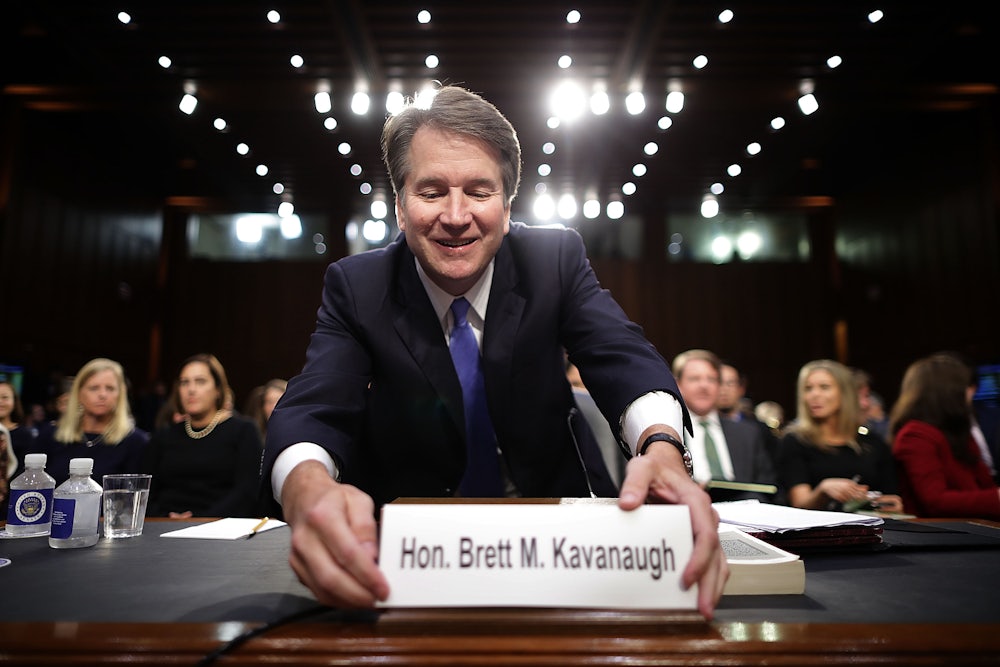The bombshell news that Christine Blasey Ford, a research psychologist, has come forward to accuse Supreme Court nominee Brett Kavanaugh and his friend Mark Judge of sexually assaulting her when they were all teenagers presents a dilemma for those who support his nomination. Do they continue to fight on Kavanaugh’s behalf and risk looking like they are indifferent to serious allegations of sexual assault? Or do they push Kananaugh to resign, even amid ambiguous evidence, at the cost of due process?
Between these two stark choices lie a range of options. One of the most thoughtful responses was from Sarah Quinlan of RedState who argued that a thorough investigation of the allegations was needed to preserve the legitimacy of the courts. “It would hurt the legitimacy of the Supreme Court to force a confirmation through when there appears to be a serious and credible accusation without an attempt to investigate the claims,” she contended.
An equally judicious approach was taken by David French of National Review, who judged the accusation as “serious” but not definitive. French also allowed that more evidence could come forward to change that assessment, so his position seems to be the same as Quinlan: Let the process shift through competing claims.
Some of French’s colleagues reacted differently. Jim Geraghty muddied the water by pointing to a lack of corroborating evidence: “As of this writing, there are no photographs of the two together, no letters between them, no physical evidence proving that the two met each other, much less that the events occurred as she described.” But it’s not surprising that such letters and photographs don’t exist. Ford is not claiming that she and Kavanaugh had a relationship. Rather, her account is of being assaulted by him at a small party. Asking for evidence that isn’t pertinent to the claims is clearly a tactic of obfuscation.
In The Federalist, David Marcus claimed that the fact the allegations weren’t brought forward in the hearings is proof they were weak. “After a lifetime of good service, Kavanaugh is being thrown under the bus of a single vague accusation,” Marcus laments. “Feinstein could have raised this months ago, could have made it a point of questioning during the hearings. She didn’t. ... I think she knew it wasn’t a strong enough allegation.” Marcus’s narrative ignores Ford’s own account, however: Ford herself was deeply divided, wanting to share her story but unwilling to go public. That fact alone explains why the story came out the way it did, via leaks after after the hearings.
Many on the right have argued that the allegations should not be given much weight since Kavanaugh was 17 years old at the time. The polemicists making this claim—and one libertarian, Megan McArdle—went so far as to suggest that it would be no problem if Kavanaugh even committed murder or rape as a teen:
In high school, I was physically bullied by 17 y.o. boys, in a sexually humiliating way (but not sex). It affected the direction of my life. They never apologized. Still, I wouldn’t hold that against them if they were nominated for the Court. They were boys.
— Rod Dreher (@roddreher) September 17, 2018
I would be cool with a teen murderer getting a lifetime appointment to the Supreme Court. I think there's good reason we expunge juvenile records, and would raise the expungement age to 21.
— Megan McArdle (@asymmetricinfo) September 14, 2018
As against those who argue that the accusation is likely true but immaterial, others claim that Kavanaugh is the target of a smear. Candace Owens, the communications director of Turning Points USA, described it as a #MeTooWitchhunt:
Brett Kavanaugh should be confirmed IMMEDIATELY.
— Candace Owens (@RealCandaceO) September 17, 2018
It is time for Americans to send a STRONG message to the anarchist Democrats that we will no longer tolerate their disgusting, corrupt, low-bar antics.
The #MeTooWitchhunt needs to come to an END once and for all.
